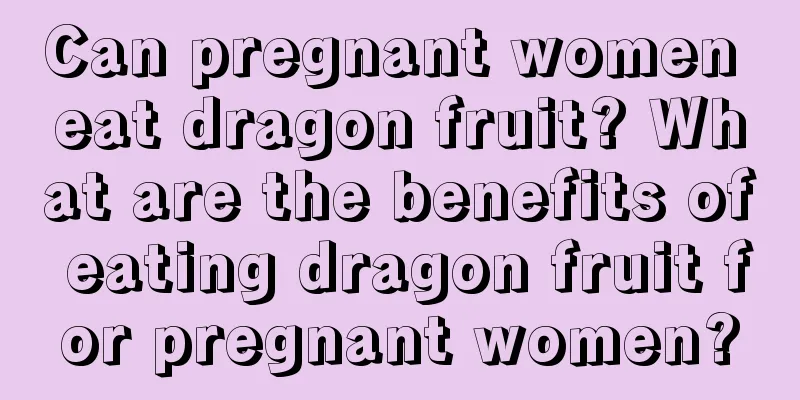What is the effect of high blood pressure on the fetus during pregnancy?

|
Hypertension is a very common physical disease. Many people suffer from it. If hypertension is severe, it will have a great impact on physical health. Female friends must take good care of their bodies during pregnancy, which is better for both themselves and the fetus. What are the effects of high blood pressure in pregnant women on the fetus?1. Pregnant women with high blood pressure are more likely to develop preeclampsia Some pregnant women have essential hypertension, and the impact of essential hypertension on the fetus is mainly determined by the level of blood pressure before and during pregnancy (especially in the late pregnancy). The higher the blood pressure, the more likely it is to develop preeclampsia, and the worse the prognosis of the fetus. If proteinuria occurs, it will be more detrimental to the prognosis of the fetus. The earlier the proteinuria appears, the worse the prognosis of the fetus. 15% to 32% of pregnant women with essential hypertension will increase the incidence of preeclampsia, stillbirth, premature birth, placental abruption, and perinatal mortality. Severe preeclampsia or eclampsia may threaten the lives of pregnant women and fetuses. What's worse is that this disease also has some follow-up effects. For example, if a baby girl is born, the risk of developing preeclampsia in the future is also high. Even if the expectant mother is treated properly and escapes the catastrophe of eclampsia, the risk of hypertension, diabetes, and thrombotic diseases in the future will be several times higher than that of ordinary people. 2. Pregnant women with high blood pressure are more likely to suffer from pregnancy-induced hypertension syndrome Some pregnant women have no diseases before pregnancy, but after 20 weeks of pregnancy, they develop edema, proteinuria, and increased blood pressure. This is a unique disease during pregnancy, namely pregnancy-induced hypertension syndrome. Pregnancy-induced hypertension syndrome will not only damage the mother's own heart, brain, liver, kidney and coagulation system, but also affect the fetus and placenta, especially the placenta, which will cause placental dysfunction. Once the placental function is affected, it can cause fetal intrauterine growth retardation, stillbirth, stillbirth or neonatal death. Moreover, severe cases often require early termination of pregnancy for treatment, because pregnancy-induced hypertension syndrome is a disease unique to pregnant women, and the condition can improve on its own after termination of pregnancy, so timely termination of pregnancy is beneficial to both mother and baby. However, this will result in the fetus being a premature baby, who has poor independent living ability, weak constitution, and high mortality rate, so pregnancy-induced hypertension syndrome is seriously harmful to the mother and fetus. Does high blood pressure affect the fetus?Some women did not have high blood pressure originally, but after becoming pregnant, they developed symptoms of high blood pressure due to hormonal changes. Pregnant women need to pay special attention to these high blood pressure problems, otherwise it will cause certain harm to the growth or delivery of the fetus. So, what effect does high blood pressure in pregnant women have on the fetus? Hypertension in pregnant women may directly lead to fetal death, fetal growth retardation, newborn death, etc. Mainly, hypertension can cause edema, proteinuria, headache, convulsions, coma, etc. in pregnant women, and may cause renal and heart failure in pregnant women, thereby affecting insufficient blood supply to the placenta, causing changes in the function of the placenta, and thus affecting the health of the fetus. Hypertension in pregnant women not only has a significant impact on the fetus, but also puts the mother in danger, which may result in two deaths. When facing the problem of hypertension, we must be able to take it seriously. If it is severe hypertension, pregnant women need to be hospitalized for treatment to slowly relieve the discomfort. The harm of pregnancy-induced hypertension to expectant mothers and babiesPregnancy-induced hypertension (PIH) is a common disease unique to pregnant women, with clinical features of hypertension, edema, proteinuria, convulsions, coma, heart and kidney failure, and even maternal and child death. PIH is divided into mild, moderate and severe according to its severity. Severe PIH is also called preeclampsia and eclampsia. Eclampsia is convulsions on the basis of high blood pressure. After pregnancy, the nutrition and health of the baby come from the expectant mother. Therefore, when the expectant mother has health problems, the health of the baby will also be affected accordingly. Harm to mother 1. Increased risk of caesarean section Most pregnant women with pregnancy-induced hypertension have mild symptoms and don't show them until close to delivery (37 weeks or later). If this is the case for you, your risk of having an induced labor or cesarean section is slightly higher than that of a mother who has a regular cesarean section, but fortunately, the health of you and your baby will not be greatly affected. 2. Suffering from preeclampsia About 1/4 of pregnant women with gestational hypertension will develop preeclampsia during pregnancy or delivery, or shortly after giving birth. If a pregnant woman develops gestational hypertension within 30 weeks of pregnancy, the chance of further developing preeclampsia is 50%. 3. Heart failure, placental abruption Pregnancy-induced hypertension syndrome can easily cause early placental abruption, heart failure, coagulation disorder, cerebral hemorrhage, renal failure and postpartum blood circulation disorder, etc. Cerebral hemorrhage, heart failure and disseminated intravascular coagulation are the main causes of death in patients with pregnancy-induced hypertension syndrome. Harm to the baby 1. Developmental Delay The fetuses of pregnant women with gestational hypertension have a high incidence of intrauterine growth retardation and their birth weight is lower than the normal standard. In severe cases, it can even lead to fetal death. 2. Premature birth As the expectant mother's condition worsens, early delivery is often required, resulting in premature birth. Premature babies have low survival ability and are prone to respiratory diseases such as suffocation, pneumonia, and hyaline membrane disease, which increases the neonatal mortality rate. 3. Impact on intelligence Babies born to mothers with gestational hypertension may not have the same physical and intellectual development as normal babies, which are often not fully manifested until school age, or they may have some neurological sequelae such as ADHD, cerebral palsy, etc. Being responsible for your baby means being responsible for yourself Many expectant mothers are relatively healthy before pregnancy, so they relax their vigilance during pregnancy. There will be some misunderstandings, such as normal blood pressure before pregnancy, so you will not get gestational hypertension during pregnancy; no symptoms during pregnancy means no gestational hypertension, etc. In fact, this is wrong. After pregnancy, one body has two people to use, and there will always be big and small problems. But don't panic too much. Regular prenatal check-ups and receiving treatment according to the doctor's requirements will definitely be fine! How to control hypertension in pregnant womenIf a pregnant woman's blood pressure is too high, it is not good for the fetus, and there are certain harms. Facing the problem of high blood pressure, pregnant women must control it well, which is also very harmful to the fetus. Since we have to control it, we must adopt the corresponding methods, so how to control high blood pressure in pregnant women? 1. Control your energy intake and don't let your weight soar too fast. After knowing they are pregnant, many women start to eat a lot, which makes them gain a lot of weight. It is because of obesity that high blood pressure occurs. Since you already have high blood pressure, you need to adjust your diet and eat less fried and high-sugar foods. 2. Reduce the intake of saturated fat. Saturated fat is harmful to the human body, so it is best to consume as little as possible. It is recommended to eat less animal oil and more vegetable oil, and the amount of cooking oil used every day should also be controlled. 3. Sufficient protein intake. Fish and soybeans are rich in protein, and their intake must be guaranteed to ensure the healthy growth of the fetus. 4. Calcium. Calcium intake is very important during breastfeeding. You must drink milk or other calcium products every day. |
>>: Can Zhenshiming eye drops relieve fatigue? Can Zhenshiming eye drops relieve myopia?
Recommend
The four characteristics of strong male fertility are easy to conceive
First, if you exercise regularly, your chances of...
Can a one-year-old baby eat grapefruit? How to eat grapefruit for a one-year-old baby
Fruits are very rich in nutrients, and these nutr...
Does the crib contain formaldehyde? What should I do if the crib smells?
Cribs are products that many babies need. Usually...
What should a virgin do if she is nervous for the first time? Will a virgin bleed for the first time?
Many female friends will be nervous and afraid wh...
Nursing measures for postpartum uterine contraction pain Do I need to take uterine contraction injections after delivery?
Pregnancy and childbirth are divided into natural...
Is Kunling's second child a boy or a girl?
Kunling's first child was Xiao Zhou Zhou, a c...
How to bathe your baby correctly? What is the water temperature for bathing your baby?
Giving your baby a bath is a difficult and arduou...
Is the Thai TwinLotus Chinese Herbal Toothpaste good to use? Review
Toothpaste is a necessity in our daily life. We a...
What characters are good for naming babies born in the Year of the Rat? Taboos for naming babies born in the Year of the Rat in 2020
There is still one month left until the Year of t...
How much is a box of Buckyball? Low-priced Internet celebrity toys
The popular toy Buck Ball has risks, as it is eas...
How to read the fetal heart rate monitoring chart? How much does fetal heart rate monitoring cost?
In the third trimester, when pregnant mothers hav...
Check whether Bausch and Lomb contact lenses are genuine or fake. Will Bausch and Lomb contact lenses curl up?
The quality of Bausch and Lomb contact lenses is ...
Talking about aesthetic education: understanding art from graffiti
In our understanding, aesthetic education should ...
What vaccines should babies receive and when is the best time to get them?
Babies must be vaccinated soon after birth to pre...
What is the nutritional value of Chinese cabbage? What are the benefits of eating Chinese cabbage?
Have you ever eaten Chinese cabbage in your life?...









